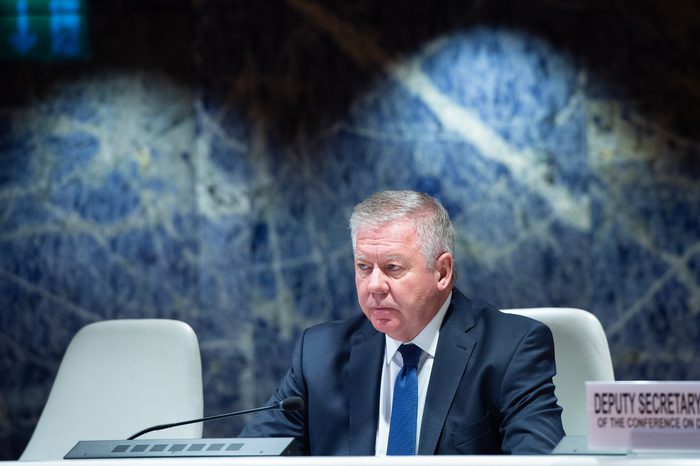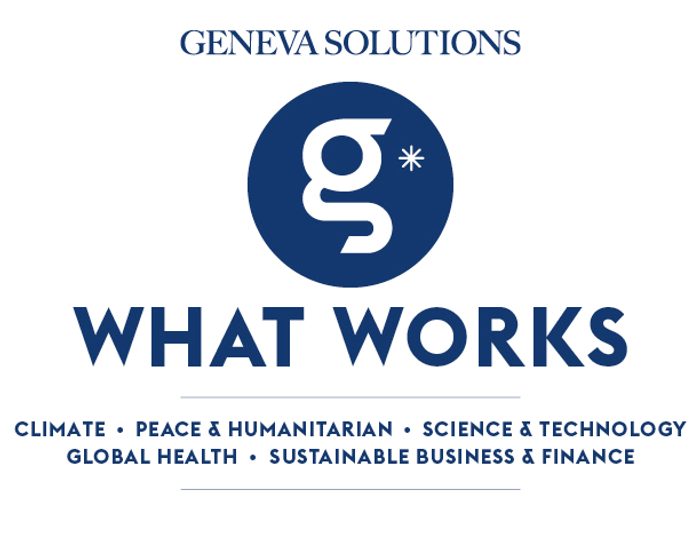Good morning, this is Kasmira. Today, we hear from Russia’s ambassador to the UN in Geneva, who explains why Switzerland’s compromised neutrality means it is not fit to hold peace talks on Ukraine.
A year since the massive earthquake that hit Syria and Turkey, the two countries are still grappling with the devastation left in its wake.
And Russian journalist Elena Kostioutchenko of Novaya Gazeta fame, on a passing visit through Geneva, presents her new book on her homeland. |

Gennady Gatilov, Russia’s ambassador to the UN in Geneva, at a session of the Conference on Disarmament, 2 March 2023. (UN Photo/Violaine Martin)
|
|
|
Bringing you the latest from UN press briefings in Geneva.
|
|
🏚️SHAKY GROUND.
Over 55,000 people lost their lives in southern Turkey and Syria last February after a 7.8 magnitude earthquake hit the region, reducing entire communities to rubble. The disaster led to massive international rescue and aid efforts involving dozens of countries and organisations. A year later, as other crises have emerged, support, in particular for Syria, has fallen by the wayside.
“The term forgotten crisis is sometimes used for Syria, but it is a gruesome reality for the people who are struggling to get by every day,” Mads Brinch Hansen, head of the International Federation of Red Cross and Red Crescent Societies’ (IFRC) Syria delegation, told journalists in Geneva on Tuesday.
|
|
In numbers.
“The situation is more dire than ever before,” he added, with 16.7 million people expected to need humanitarian assistance in 2024, up from 15.3m in 2023. In north-west Syria alone, more than 40,000 people remain displaced by the earthquake and are living in temporary reception centres, UN Refugee Agency’s Shabia Mantoo said also at the press briefing.
|
|
Funding gap.
Reconstruction efforts in Syria following the earthquake and coming after more than a decade of civil war, have been almost non-existent due to limited funding, a spiralling economy, and a lack of political will, Hansen said. “Today, most major cities in Syria still lie in ruins, with very limited functioning infrastructure and no resources to rebuild.” Funding for Syria has been in decline for the last five years, he said, with many donors reprioritising and turning their attention to other crises. The IFRC’s two appeals for Turkey and Syria totalling 500 million Swiss francs are only 35 per cent and 57 per cent funded, the organisation said in a statement on Monday, calling for further support.
|
|
🌱SEEDBANK RAID.
As if war-torn Sudan was not struck by enough hardships, the country’s main seed bank containing thousands of specimens collected over the last 40 years, has also been looted, the FAO warned on Tuesday. Spokesperson Adam Dao said that urgent efforts are now underway to secure access to the facility, located in Sudan’s second biggest city Wad Medani, captured by Sudan’s Rapid Support Forces in December, to transport the seeds to a safer location. Dao said the plants, which are stored in a deep freezer, "are highly important for food security in the region and globally”.
|
|
🦠CHOLERA CALLS.
Cholera is thriving in eastern and southern Africa, according to the World Health Organization . In the first four weeks of the year, 10 countries in the region have reported more than 26,000 cases and 700 deaths – almost twice the numbers reported in the same period last year. Zambia and Zimbabwe are suffering their worst-ever outbreaks, the global health body said, with floods and droughts brought on by climate change further reducing access to clean water and creating a recipe for disaster.
|
|
Stigma.
In Zambia, the majority of people are dying in the community and not in health centres where they could receive treatment, in large part due to the stigma attached to the disease, Dr Fiona Braka, emergency operations manager at the WHO’s regional office for Africa told journalists. People are afraid of going to a clinic and of the impact on their family if others find out.
|
|
Coming clean.
Over 1.7 million people have been vaccinated in Zambia with a similar campaign underway in Zimbabwe, with over 31 tonnes of emergency supplies sent to the two countries combined. “We will continue to see records being broken as long as people do not have access to clean water and sanitation facilities,” Braka said, adding that, scaling up surveillance, treatment – and money – were needed to quash the disease.
|
|
Here's what else is happening
|
|
GS news is a new media project covering the world of international cooperation and development. Don’t hesitate to forward our newsletter!
Have a good day!
|

|
|
Avenue du Bouchet 2
1209 Genève
Suisse
|
|
|
|








